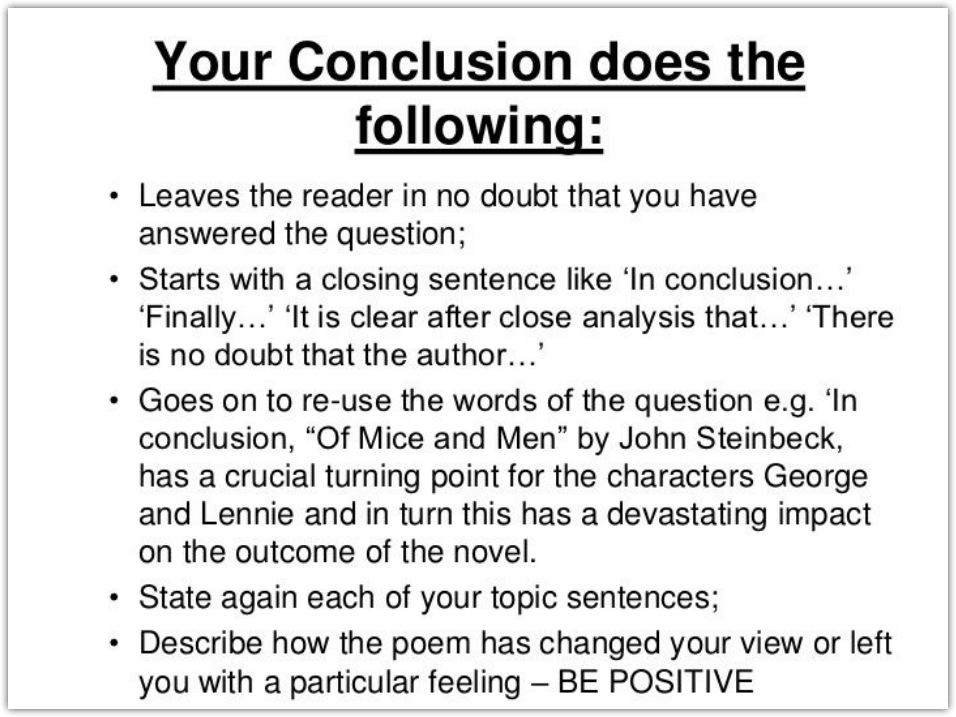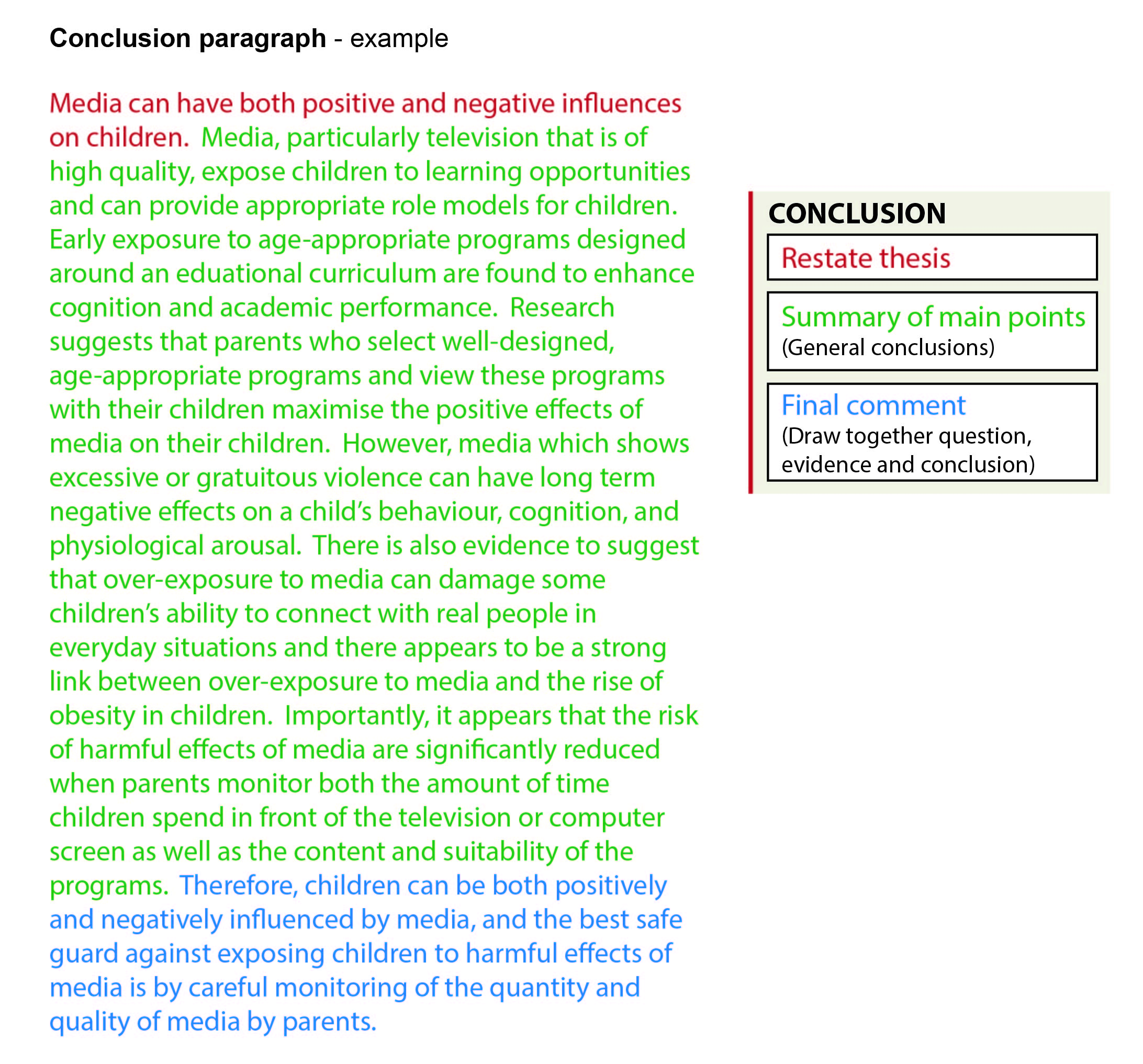
Try to use new and interesting words to conclude an essay or any other paper. At this point in writing, get the focus of your writing a bit broader to show the bigger purpose of your essay. Keep the conclusion paragraph simple and clear. One paragraph length is enough for various types of essays Jan 11, · What your conclusion should include. Ask yourself: “So what?”. At some point in your life, a teacher has probably told you that the end of an essay should answer the question “So what?” Add perspective. Consider the clincher Jul 07, · How to conclude an essay: Restate the thesis by making the same point with other words (paraphrase). Review your supporting ideas. For that, summarize all arguments by paraphrasing how you proved the thesis. Connect back to the essay hook and relate your closing statement to the opening one. Combine Estimated Reading Time: 7 mins
How to Conclude an Essay | Interactive Example
The conclusion paragraph is indeed the section that gets the least attention. By the time people get to the end, they are often confused about how to approach it.
Regardless of how strong the arguments raised are, if your conclusion is weak, your essay will be rendered incomplete. So you have stated your thesis, presented background information, introduced evidence, stated your point of view and refuted objections within the argumentative essay. Now, it is time to conclude. A conclusion paragraph is like the final farewell - it needs to be impactful and effective. The way you choose to conclude your essay can make or break the impression you leave on the instructor.
Whether or not the essay is written at a stretch, once you are done with the introduction and body paragraphs, it is important to give a thorough reading. This is the time you can assess whether you have left any key points or examples out and make amends. Once that is done, read it once again in its entirety — this is the first step in planning the concluding paragraph.
By going over the rest of the essay, you can make a note of the main points and ensure you reinstate them in the conclusion. Begin the conclusion by reminding the reader of your viewpoint by reinstating the most logical arguments you made in the essay. Use this space to tie loose ends and summarize the main points.
The conclusion needs to act as a reminder, stating why your viewpoint matters. Remember this is your last chance to convince the reader about your chosen argument. What is important is readdressing your point of view in the most convincing manner, how to write an conclusion for an essay.
So you have reminded the reader of your argument or the stand you are taking in the essay. Why not push them to think about it? What does that include? You can discuss hypothetical situations along with examples that can arise if the reader goes with your point of view.
Alternatively, you can also get them to ponder about ramifications of going with the opposing point of view. Either way, the idea is to get them to consider your main argument and derive logical sense out of it.
Remember the goal of the concluding paragraph needs to be to leave the reader with a memorable final impression and the most effective way to do that is to appeal to their emotions. While the stance needs to be put forth logically, how to write an conclusion for an essay can certainly make emotional appeals in the last paragraph to get them to agree.
Some questions are not meant to be answered - they are just used for emphasis and to leave the reader with something to think about. So yes, you can consider ending with a question and asking a rhetorical question in the conclusion paragraph. This keeps the reader engaged till the last sentence and enhances the recall value of your essay. Just make sure your questions are relevant to the main point of the argumentative essay and ensure they are crafted in a manner that strengthens your argument or point of view.
By the time you reach the conclusion, you should have said it all, how to write an conclusion for an essay. Doing this weakens the paper and reflects your poor planning. Imagine reading the thesis statement in the introduction and having to read it all over again in the conclusion paragraph. Repeating the thesis statement is a complete no-no. You should rewrite it in other words while tying together the main arguments raised but doing a copy-paste job without adding any value will do nothing to the conclusion.
If anything, you should take your thesis statement to the next level and substantiate it such that the reader can make the connection and be convinced about your writing. The last thing you want to do is let all that effort go to waste by being apologetic in the last paragraph. You need to be confident about your point of view and own up to it. Yes, transitions are important. The right transition words make the essay more cohesive and help the reader go from paragraph to another with ease, while retaining the connection between them.
Hence, you must use transition words how to write an conclusion for an essay make the flow seem how to write an conclusion for an essay and smooth. Integrating quotes in the introduction or body paragraphs is a great way to hook readers or emphasize a point but ending the essay with a quote is not really a good idea.
Why, you ask? You want readers to leave thinking about the points and arguments you raised, not what some leader or author had to say about the same topic. As the conclusion paragraph is the last step in the writing process, it often gets sidelined. This is especially true when you are writing your essay in the very last minute.
The conclusion is as important as the introduction if not more because it is your golden opportunity to reinstate the main points and thesis statement in a concise manner and package it such that it gives a feeling of closure.
Like it or not — your essay is likely to be remembered by the most recent thing the reader has read which happens to be the concluding paragraph. This means that you certainly cannot get lazy while writing this section and let all your efforts go waste.
Yes, we at Writers Per Hour are a professional essay writing service. Our team of experts specializes in delivering original, well-written essays including argumentative, how to write an conclusion for an essay, narrative, persuasive and more. From writing captivating introductions to interesting conclusions, we will take care of it all. So, the next time you are stuck with writing an essay, contact us and let us help you ace it! How To Write an Introduction for an Argumentative Essay.
What are Good Argumentative Essay Topics: 5 Tips to Make the Right Choice. Toggle navigation, how to write an conclusion for an essay. HOME BENEFITS FAQ PRICES SAMPLES BLOG CONTACTS. You have been asked to write an argumentative essay and after all the work you put into doing research and writing the introductory and body paragraphs, you are left wondering about what you can write in the conclusion paragraph.
posted at Jun 21 last edit at Mar 30 by Stefani Holloway. Stefani is a professional writer and blogger at Writers Per Hour. She primarily contributes articles about career, leadership, business and writing. Her educational background in family how to write an conclusion for an essay and journalism has given her a broad base from which to approach many topics.
She especially enjoys preparing resumes for individuals who are changing careers. How to Conduct Secondary Research for Your Essay. May 11 Read More. How to Write Interesting Essays That Won't Bore Your Professors. Apr 19 Feb 16 How to Start a Commemorative Speech: 7 Tips for College Students. Jan 19
How to write a Conclusion for an Essay (with the 5Cs Conclusion Method)
, time: 7:51How to Write a Strong Conclusion for Your Essay

Feb 22, · Restate the thesis: An effective conclusion brings the reader back to the main point, reminding the reader of the purpose of the essay. However, avoid repeating the thesis verbatim. Paraphrase your argument slightly while still preserving the primary point Jan 24, · How to write a conclusion paragraph. Step 1: Return to your thesis. To begin your conclusion, signal that the essay is coming to an end by returning to your overall argument. Don’t just Step 2: Review your main points. Step 3: Show why it matters. What shouldn’t go in the conclusion? More Reviews: 2 To establish a sense of closure, you might do one or more of the following: Conclude by linking the last paragraph to the first, perhaps by reiterating a word or phrase you used at the beginning. Conclude with a sentence composed mainly of one-syllable words. Simple language can help create an
No comments:
Post a Comment